- Home
- Sophie Kinsella
Sophie Kinsella's Shopaholic 5-Book Bundle Page 2
Sophie Kinsella's Shopaholic 5-Book Bundle Read online
Page 2
Or I could always move abroad.
“Becky?” My head jerks up and I see Clare holding this month’s news list. “Have you finished the piece on Lloyds?”
“Nearly,” I lie. As she’s watching me, I feel forced to summon it up on my computer screen, just to show I’m willing.
“This high-yield, 60-day access account offers tiered rates of interest on investments of over £2,000,” I type onto the screen, copying directly from a press release in front of me. “Long-term savers may also be interested in a new stepped-rate bond which requires a minimum of £5,000.”
I type a full stop, take a sip of coffee, and turn to the second page of the press release.
This is what I do, by the way. I’m a journalist on a financial magazine. I’m paid to tell other people how to organize their money.
Of course, being a financial journalist is not the career I always wanted. No one who writes about personal finance ever meant to do it. People tell you they “fell into” personal finance. They’re lying. What they mean is they couldn’t get a job writing about anything more interesting. They mean they applied for jobs at The Times and The Express and Marie-Claire and Vogue and GQ, and all they got back was “Piss off.”
So they started applying to Metalwork Monthly and Cheese-makers Gazette and What Investment Plan? And they were taken on as the crappiest editorial assistant possible on no money whatsoever and were grateful. And they’ve stayed on writing about metal, or cheese, or savings, ever since—because that’s all they know. I myself started on the catchily titled Personal Investment Periodical. I learned how to copy out a press release and nod at press conferences and ask questions that sounded as though I knew what I was talking about. After a year and a half—believe it or not—I was head-hunted to Successful Saving.
Of course, I still know nothing about finance. People at the bus stop know more about finance than me. Schoolchildren know more than me. I’ve been doing this job for three years now, and I’m still expecting someone to catch me out.
That afternoon, Philip, the editor, calls my name, and I jump in fright.
“Rebecca?” he says. “A word.” And he beckons me over to his desk. His voice seems lower all of a sudden, almost conspiratorial, and he’s smiling at me, as though he’s about to give me a piece of good news.
Promotion, I think. It must be. He read the piece I wrote on international equity securities last week (in which I likened the hunt for long-term growth to the hunt for the perfect pair of summer mules) and was bowled over by how exciting I made it all sound. He knows it’s unfair I earn less than Clare, so he’s going to promote me to her level. Or even above. And he’s telling me discreetly so Clare won’t get jealous.
A wide smile plasters itself over my face and I get up and walk the three yards or so to his desk, trying to stay calm but already planning what I’ll buy with my raise. I’ll get that swirly coat in Whistles. And some black high-heeled boots from Pied à Terre. Maybe I’ll go on holiday. And I’ll pay off that blasted VISA bill once and for all. I feel buoyant with relief. I knew everything would be OK …
“Rebecca?” He’s thrusting a card at me. “I can’t make this press conference,” he says. “But it could be quite interesting. Will you go? It’s at Brandon Communications.”
I can feel the elated expression falling off my face like jelly. He’s not promoting me. I’m not getting a raise. I feel betrayed. Why did he smile at me like that? He must have known he was lifting my hopes.
“Something wrong?” inquires Philip.
“No,” I mutter. But I can’t bring myself to smile. In front of me, my new swirly coat and high-heeled boots are disappearing into a puddle, like the Wicked Witch of the West. No promotion. Just a press conference about … I turn over the card. About a new unit trust. How could anyone possibly describe that as interesting?
Two
THERE’S JUST ONE essential purchase I have to make on the way to the press conference—and that’s the Financial Times. The FT is by far the best accessory a girl can have. Its major advantages are:
1. It’s a nice color.
2. It only costs eighty-five pence.
3. If you walk into a room with it tucked under your arm, people take you seriously. With an FT under your arm, you can talk about the most frivolous things in the world, and instead of thinking you’re an airhead, people think you’re a heavyweight intellectual who has broader interests, too.
At my interview for Successful Saving, I went in holding copies of the Financial Times and the Investor’s Chronicle—and I didn’t get asked about finance once. As I remember it, we spent the whole time talking about holiday villas and gossiping about other editors.
So I stop at a newsstand and buy a copy of the FT. There’s some huge headline about Rutland Bank on the front page, and I’m thinking maybe I should at least skim it, when I catch my reflection in the window of Denny and George.
I don’t look bad, I think. I’m wearing my black skirt from French Connection, and a plain white T-shirt from Knickerbox, and a little angora cardigan which I got from M&S but looks like it might be Agnès b. And my new square-toed shoes from Hobbs. Even better, although no one can see them, I know that underneath I’m wearing my gorgeous new matching knickers and bra with embroidered yellow rosebuds. They’re the best bit of my entire outfit. In fact, I almost wish I could be run over so that the world would see them.
It’s a habit of mine, itemizing all the clothes I’m wearing, as though for a fashion page. I’ve been doing it for years—ever since I used to read Just Seventeen. Every issue, they’d stop a girl on the street, take a picture of her, and list all her clothes. “T-Shirt: Chelsea Girl, Jeans: Top Shop, Shoes: borrowed from friend.” I used to read those lists avidly, and to this day, if I buy something from a shop that’s a bit uncool, I cut the label out. So that if I’m ever stopped in the street, I can pretend I don’t know where it’s from.
So anyway. There I am, with the FT tucked under my arm, thinking I look pretty good, and half wishing someone from Just Seventeen would pop up with a camera—when suddenly my eyes focus and snap to attention, and my heart stops. In the window of Denny and George is a discreet sign. It’s dark green with cream lettering, and it says: SALE.
I stare at it, and my skin’s all prickly. It can’t be true. Denny and George can’t be having a sale. They never have a sale. Their scarves and pashminas are so coveted, they could probably sell them at twice the price. Everyone I know in the entire world aspires to owning a Denny and George scarf. (Except my mum and dad, obviously. My mum thinks if you can’t buy it at Bentalls of Kingston, you don’t need it.)
I swallow, take a couple of steps forward, then push open the door of the tiny shop. The door pings, and the nice blond girl who works there looks up. I don’t know her name but I’ve always liked her. Unlike some snotty cows in clothes shops, she doesn’t mind if you stand for ages staring at clothes you really can’t afford to buy. Usually what happens is, I spend half an hour lusting after scarves in Denny and George, then go off to Accessorize and buy something to cheer myself up. I’ve got a whole drawerful of Denny and George substitutes.
“Hi,” I say, trying to stay calm. “You’re … you’re having a sale.”
“Yes.” The blond girl smiles. “Bit unusual for us.”
My eyes sweep the room. I can see rows of scarves, neatly folded, with dark green “50 percent off” signs above them. Printed velvet, beaded silk, embroidered cashmere, all with the distinctive “Denny and George” signature. They’re everywhere. I don’t know where to start. I think I’m having a panic attack.
“You always liked this one, I think,” says the nice blond girl, taking out a shimmering gray-blue scarf from the pile in front of her.
Oh God, yes. I remember this one. It’s made of silky velvet, overprinted in a paler blue and dotted with iridescent beads. As I stare at it, I can feel little invisible strings, silently tugging me toward it. I have to touch it. I have to wear it. It’s the most
beautiful thing I’ve ever seen. The girl looks at the label. “Reduced from £340 to £120.” She comes and drapes the scarf around my neck and I gape at my reflection.
There is no question. I have to have this scarf. I have to have it. It makes my eyes look bigger, it makes my haircut look more expensive, it makes me look like a different person. I’ll be able to wear it with everything. People will refer to me as the Girl in the Denny and George Scarf.
“I’d snap it up if I were you.” The girl smiles at me. “There’s only one of these left.”
Involuntarily, I clutch at it.
“I’ll have it,” I gasp. “I’ll have it.”
As she’s laying it out on tissue paper, I take out my purse, open it up, and reach for my VISA card in one seamless, automatic action—but my fingers hit bare leather. I stop in surprise and start to rummage through all the pockets of my purse, wondering if I stuffed my card back in somewhere with a receipt or if it’s hidden underneath a business card … And then, with a sickening thud, I remember. It’s on my desk.
How could I have been so stupid? How could I have left my VISA card on my desk? What was I thinking?
The nice blond girl is putting the wrapped scarf into a dark green Denny and George box. My mouth is dry with panic. What am I going to do?
“How would you like to pay?” she says pleasantly.
My face flames red and I swallow hard.
“I’ve just realized I’ve left my credit card at the office,” I stutter.
“Oh,” says the girl, and her hands pause.
“Can you hold it for me?” The girl looks dubious.
“For how long?”
“Until tomorrow?” I say desperately. Oh God. She’s pulling a face. Doesn’t she understand?
“I’m afraid not,” she says. “We’re not supposed to reserve sale stock.”
“Just until later this afternoon, then,” I say quickly. “What time do you close?”
“Six.”
Six! I feel a combination of relief and adrenaline sweeping through me. Challenge, Rebecca. I’ll go to the press conference, leave as soon as I can, then take a taxi back to the office. I’ll grab my VISA card, tell Philip I left my notebook behind, come here, and buy the scarf.
“Can you hold it until then?” I say beseechingly. “Please? Please?” The girl relents.
“OK. I’ll put it behind the counter.”
“Thanks,” I gasp. I hurry out of the shop and down the road toward Brandon Communications. Please let the press conference be short, I pray. Please don’t let the questions go on too long. Please God, please let me have that scarf.
As I arrive at Brandon Communications, I can feel myself begin to relax. I do have three whole hours, after all. And my scarf is safely behind the counter. No one’s going to steal it from me.
There’s a sign up in the foyer saying that the Foreland Exotic Opportunities press conference is happening in the Artemis Suite, and a man in uniform is directing everybody down the corridor. This means it must be quite big. Not television-cameras-CNN-world’s-press-on-tenterhooks big, obviously. But fairly-good-turnout big. A relatively important event in our dull little world.
As I enter the room, there’s already a buzz of people milling around, and waitresses circulating with canapés. The journalists are knocking back the champagne as if they’ve never seen it before; the PR girls are looking supercilious and sipping water. A waiter offers me a glass of champagne and I take two. One for now, one to put under my chair for the boring bits.
In the far corner of the room I can see Elly Granger from Investor’s Weekly News. She’s been pinned into a corner by two earnest men in suits and is nodding at them, with a glassy look in her eye. Elly’s great. She’s only been on Investor’s Weekly News for six months, and already she’s applied for forty-three other jobs. What she really wants to be is a beauty editor on a magazine, and I think she’d be really good at it. Every time I see her, she’s got a new lipstick on—and she always wears really interesting clothes. Like today, she’s wearing an orange chiffony shirt over a pair of white cotton trousers, espadrilles, and a big wooden necklace, the kind I could never wear in a million years.
What I really want to be is Fiona Phillips on GMTV. I could really see myself, sitting on that sofa, joshing with Eamonn every morning and interviewing lots of soap stars. Sometimes, when we’re very drunk, we make pacts that if we’re not somewhere more exciting in three months, we’ll both leave our jobs. But then the thought of no money—even for a month—is almost more scary than the thought of writing about depository trust companies for the rest of my life.
“Rebecca. Glad you could make it.”
I look up, and almost choke on my champagne. It’s Luke Brandon, head honcho of Brandon Communications, staring straight at me as if he knows exactly what I’m thinking. Staring straight down at me, I should say. He must be well over six feet tall with dark hair and dark eyes and … wow. Isn’t that suit nice? An expensive suit like that almost makes you want to be a man. It’s inky blue with a faint purple stripe, single-breasted, with proper horn buttons. As I run my eyes over it I find myself wondering if it’s by Oswald Boateng, and whether the jacket’s got a silk lining in some stunning color. If this were someone else, I might ask—but not Luke Brandon, no way.
I’ve only met him a few times, and I’ve always felt slightly uneasy around him. For a start, he’s got such a scary reputation. Everyone talks all the time about what a genius he is, even Philip, my boss. He started Brandon Communications from nothing, and now it’s the biggest financial PR company in London. A few months ago he was listed in The Mail as one of the cleverest entrepreneurs of his generation. It said his IQ was phenomenally high and he had a photographic memory.
But it’s not just that. It’s that he always seems to have a frown on his face when he’s talking to me. It’ll probably turn out that the famous Luke Brandon is not only a complete genius but he can read minds, too. He knows that when I’m staring up at some boring graph, nodding intelligently, I’m really thinking about a gorgeous black top I saw in Joseph and whether I can afford the trousers as well.
“You know Alicia, don’t you?” Luke is saying, and he gestures to the immaculate blond girl beside him.
I don’t know Alicia, as it happens. But I don’t need to. They’re all the same, the girls at Brandon C, as they call it. They’re well dressed, well spoken, are married to bankers, and have zero sense of humor. Alicia falls into the identikit pattern exactly, with her baby-blue suit, silk Hermès scarf, and matching baby-blue shoes, which I’ve seen in Russell and Bromley, and they cost an absolute fortune. (I bet she’s got the bag as well.) She’s also got a suntan, which must mean she’s just come back from Mauritius or somewhere, and suddenly I feel a bit pale and weedy in comparison.
“Rebecca,” she says coolly, grasping my hand. “You’re on Successful Saving, aren’t you?”
“That’s right,” I say, equally coolly.
“It’s very good of you to come today,” says Alicia. “I know you journalists are terribly busy.”
“No problem,” I say. “We like to attend as many press conferences as we can. Keep up with industry events.” I feel pleased with my response. I’m almost fooling myself.
Alicia nods seriously, as though everything I say is incredibly important to her.
“So, tell me, Rebecca. What do you think about today’s news?” She gestures to the FT under my arm. “Quite a surprise, didn’t you think?”
Oh God. What’s she talking about?
“It’s certainly interesting,” I say, still smiling, playing for time. I glance around the room for a clue, but there’s nothing. What’s she talking about? Have interest rates gone up or something?
“I have to say, I think it’s bad news for the industry,” says Alicia earnestly. “But of course, you must have your own views.”
She’s looking at me, waiting for an answer. I can feel my cheeks flaming bright red. How can I get out of this? After th
is, I promise myself, I’m going to read the papers every day. I’m never going to be caught out like this again.
“I agree with you,” I say eventually. “I think it’s very bad news.” My voice feels strangled. I take a quick swig of champagne and pray for an earthquake.
“Were you expecting it?” Alicia says. “I know you journalists are always ahead of the game.”
“I … I certainly saw it coming,” I say, and I’m pretty sure I sound convincing.
“And now this rumor about Scottish Prime and Flagstaff Life going the same way!” She looks at me intently. “Do you think that’s really on the cards?”
“It’s … it’s difficult to say,” I reply, and take a gulp of champagne. What rumor? Why can’t she leave me alone?
Then I make the mistake of glancing up at Luke Brandon. He’s staring at me, his mouth twitching slightly. Oh shit. He knows I don’t have a clue, doesn’t he?
“Alicia,” he says abruptly, “that’s Maggie Stevens coming in. Could you—”
“Absolutely,” she says, trained like a racehorse, and starts to move smoothly toward the door.
“And Alicia—” adds Luke, and she quickly turns back. “I want to know exactly who fucked up on those figures.”
“Yes,” gulps Alicia, and walks off.
God he’s scary. And now we’re on our own. I think I might quickly run away.
“Well,” I say brightly. “I must just go and …”
But Luke Brandon is leaning toward me.
“SBG announced that they’ve taken over Rutland Bank this morning,” he says quietly.
And of course, now that he says it, I remember that frontpage headline.
“I know they did,” I reply haughtily. “I read it in the FT.” And before he can say anything else, I walk off, to talk to Elly.
As the press conference is about to start, Elly and I sidle toward the back and grab two seats together. We’re in one of the bigger conference rooms and there must be about a hundred chairs arranged in rows, facing a podium and a large screen. I open my notebook, write “Brandon Communications” at the top of the page, and start doodling swirly flowers down the side. Beside me, Elly’s dialing her telephone horoscope on her mobile phone.

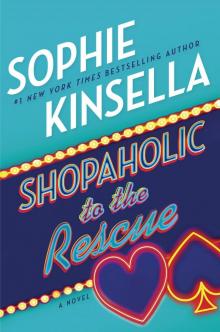 Shopaholic to the Rescue
Shopaholic to the Rescue Swimming Pool Sunday
Swimming Pool Sunday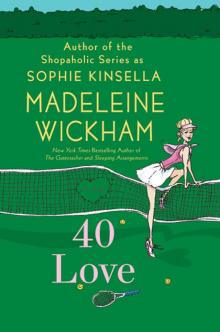 40 Love
40 Love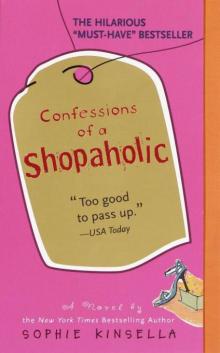 Confessions of a Shopaholic
Confessions of a Shopaholic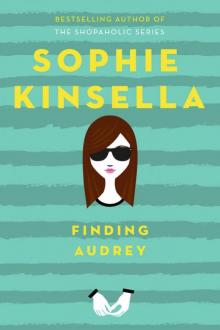 Finding Audrey
Finding Audrey Sophie Kinsella's Shopaholic 5-Book Bundle
Sophie Kinsella's Shopaholic 5-Book Bundle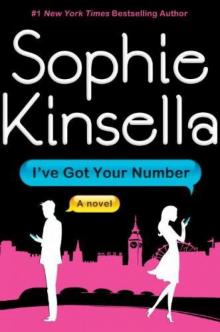 I've Got Your Number
I've Got Your Number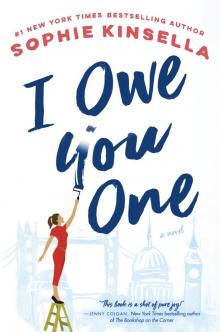 I Owe You One
I Owe You One Christmas Shopaholic
Christmas Shopaholic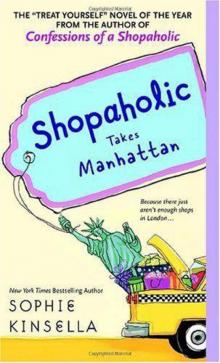 Shopaholic Takes Manhattan
Shopaholic Takes Manhattan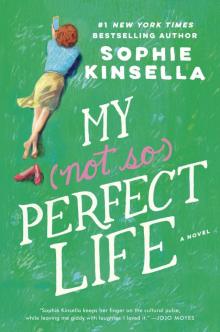 My Not So Perfect Life
My Not So Perfect Life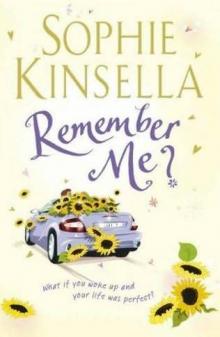 Remember Me?
Remember Me? The Tennis Party
The Tennis Party Cocktails for Three
Cocktails for Three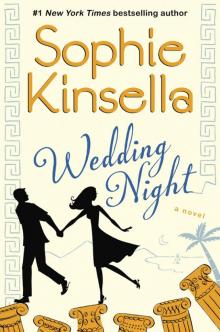 Wedding Night
Wedding Night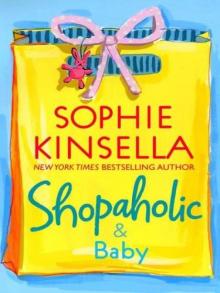 Shopaholic & Baby
Shopaholic & Baby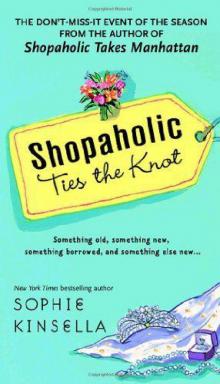 Shopaholic Ties the Knot
Shopaholic Ties the Knot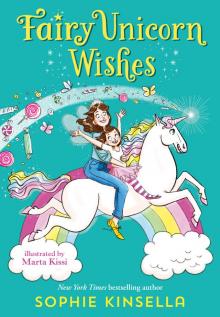 Fairy Mom and Me #3
Fairy Mom and Me #3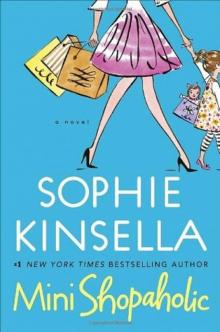 Mini Shopaholic
Mini Shopaholic Six Geese A-Laying (Mini Christmas Short Story)
Six Geese A-Laying (Mini Christmas Short Story) Can You Keep a Secret?
Can You Keep a Secret?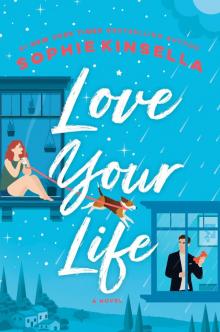 Love Your Life
Love Your Life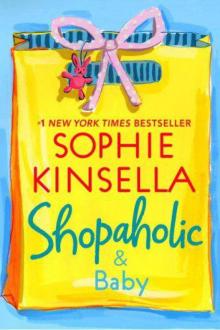 Shopaholic and Baby
Shopaholic and Baby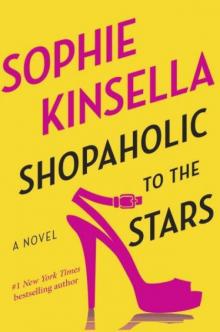 Shopaholic to the Stars
Shopaholic to the Stars Shopaholic and Sister
Shopaholic and Sister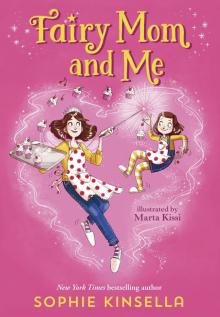 Fairy Mom and Me
Fairy Mom and Me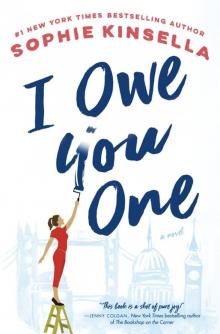 I Owe You One: A Novel
I Owe You One: A Novel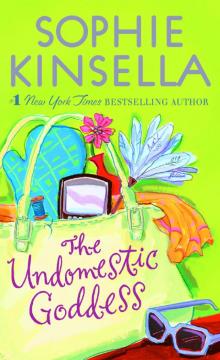 The Undomestic Goddess
The Undomestic Goddess The Secret Dreamworld of a Shopaholic:
The Secret Dreamworld of a Shopaholic: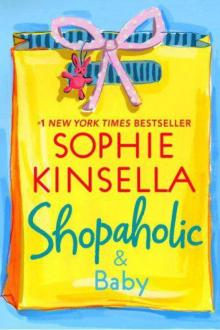 Shopaholic and Baby s-5
Shopaholic and Baby s-5 The Secret Dreamworld of a Shopaholic
The Secret Dreamworld of a Shopaholic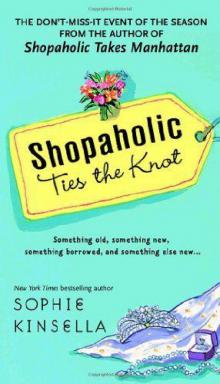 Shopaholic ties the knot s-3
Shopaholic ties the knot s-3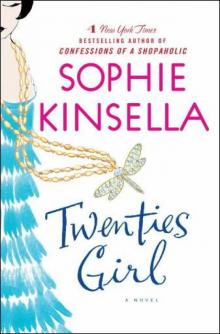 Twenties Girl
Twenties Girl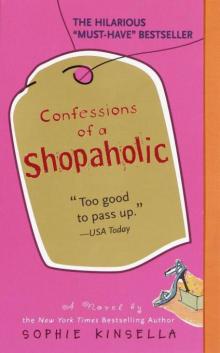 Confessions of a Shopaholic s-1
Confessions of a Shopaholic s-1 Shopaholic and sister s-4
Shopaholic and sister s-4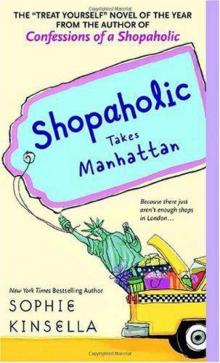 Shopaholic Takes Manhattan s-2
Shopaholic Takes Manhattan s-2